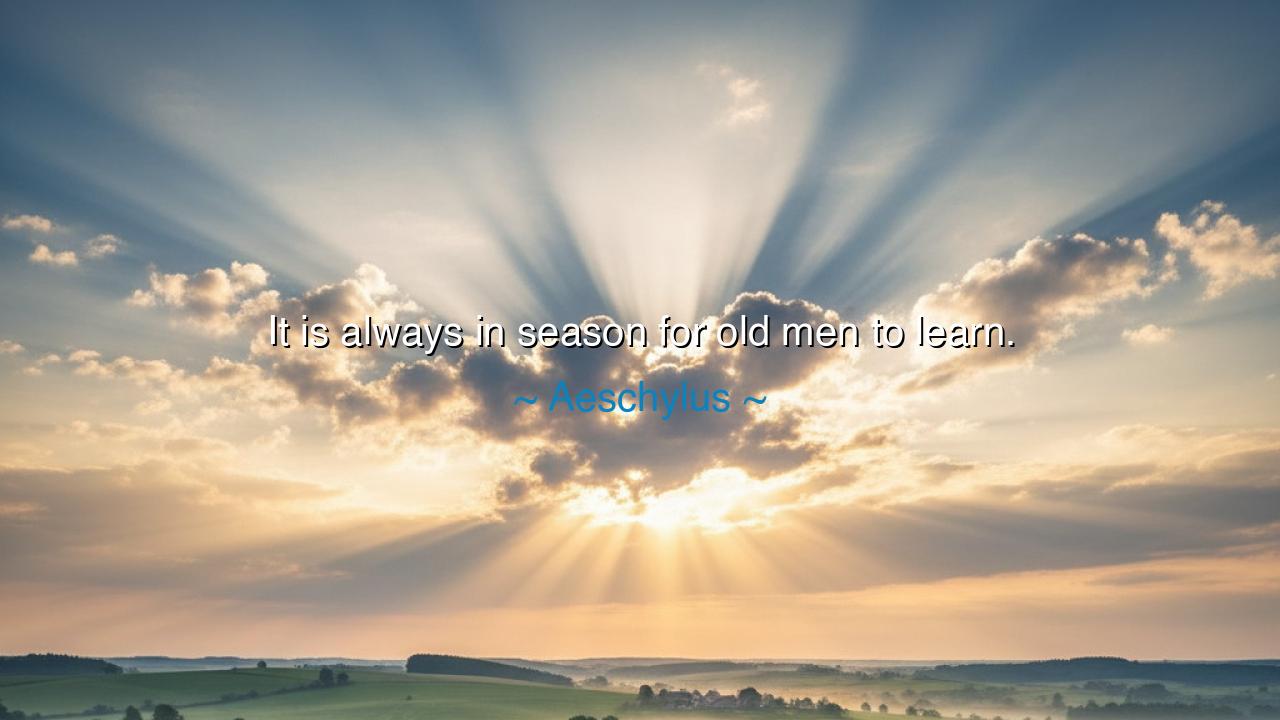
It is always in season for old men to learn.






There is enduring truth and humility in the words of Aeschylus, when he wrote: “It is always in season for old men to learn.” These few words, spoken over two thousand years ago, still carry the fragrance of wisdom — for they remind us that learning has no age, that the pursuit of knowledge and growth is a lifelong endeavor. The ancient dramatist, who lived in the fifth century before Christ, had witnessed war, glory, and the fleeting nature of human pride. From the height of his experience, he saw that even the wise and the aged, those crowned with years, must remain students of life. His words are not a gentle suggestion but a timeless command: that to live is to learn, and the moment we cease learning, we begin to die.
Aeschylus was no mere philosopher of words; he was a man forged in the fires of experience. He fought in the Persian Wars, standing at Marathon and Salamis, where Greece defended her freedom against overwhelming might. He wrote tragedies that explored the human soul — its arrogance, its suffering, its redemption. Through such experience, he came to see that wisdom is never complete. Each age of life opens new doors to understanding: youth learns through ambition, maturity through labor, and age through reflection. Thus, when he said, “It is always in season,” he meant that there is no winter for the mind, no moment when the heart must cease its search for truth.
The meaning of his quote reaches beyond education; it touches the very essence of being human. To learn is to remain alive — to keep one’s spirit fresh, curious, and open. Old age, to the unwise, is a time of retreat, of clinging to old certainties. But to the wise, it is the flowering of understanding, the moment when knowledge ripens into wisdom. The man who continues to learn in his later years keeps his soul young. He becomes, as Aeschylus himself was, a bridge between past and future — humble enough to receive new truths, yet strong enough to pass them on.
History offers countless examples of this eternal truth. Consider Socrates, who, even in the final moments before his death, spoke not as a man who knew all, but as one who still sought greater clarity. “All I know is that I know nothing,” he said — a confession not of ignorance, but of endless learning. Or think of Michelangelo, who in his eighties carved and painted with trembling hands and yet declared, “Ancora imparo” — “I am still learning.” Their lives echo the wisdom of Aeschylus: that the flame of knowledge must never be extinguished, no matter the age or the frailty of the body.
Yet, there is more. Aeschylus reminds us that learning is not only about books or arts or sciences — it is about understanding life itself. With age, one must still learn to forgive, to let go, to find peace. The lessons of the heart are as vital as those of the mind. The old man who learns patience and compassion is as much a student as the youth studying letters and numbers. In every season, life offers new teachings: in youth, we learn courage; in maturity, endurance; in old age, grace. Only the foolish believe that wisdom is ever finished.
Aeschylus’s quote also carries a quiet defiance — a challenge against complacency and arrogance. In his time, as in ours, there were those who mistook age for mastery. Yet he, the elder poet, declared the opposite: that true greatness lies in humility. The wise man does not rest upon his achievements; he continues to ask, to listen, to wonder. For life, like the sea, changes with every tide, and the sailor who thinks he knows it fully will soon be wrecked upon new waves. Thus, learning is not a task that ends — it is the breath of existence itself.
Let this be the lesson, then, passed down from Aeschylus to our own generation: Never close the mind. Let curiosity remain your companion, and humility your teacher. Learn from the young, for they carry the pulse of tomorrow; learn from the old, for they bear the scars of experience. Learn from joy and from pain, from victory and from failure. For the heart that continues to learn is never truly old — it remains forever in spring, forever renewed by wonder.
And so the ancient poet’s words endure like an eternal flame: “It is always in season for old men to learn.” Let every soul, whether young or old, remember that the season of learning is the season of life — and that wisdom, like the sun, rises anew for those who seek it, no matter how many years have passed beneath its light.






AAdministratorAdministrator
Welcome, honored guests. Please leave a comment, we will respond soon